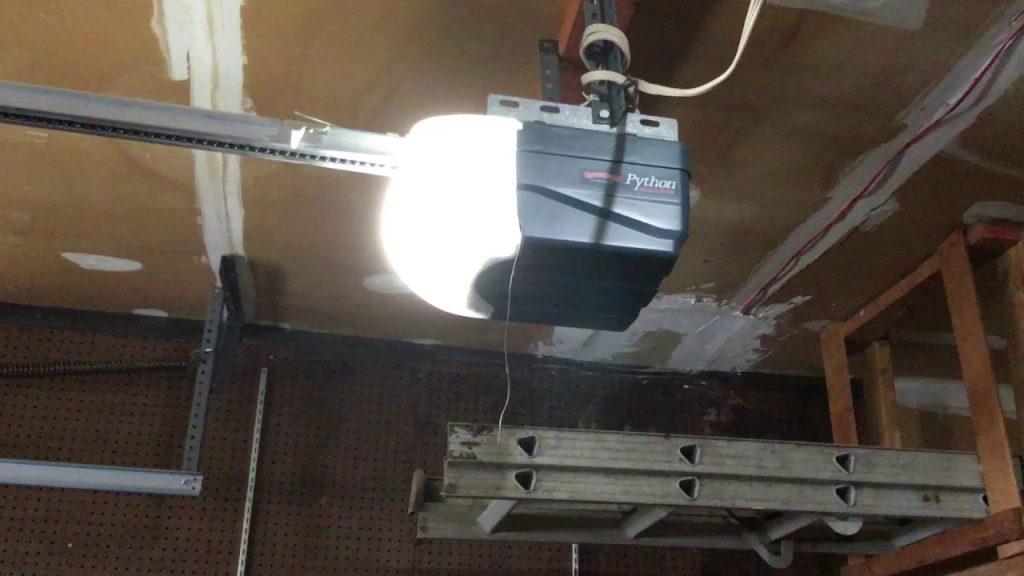A Python garage door opener offers convenience and security, but like any mechanical device, it can encounter problems. If you’re facing issues with your Python garage door opener, this troubleshooting guide is here to help. We’ll explore common problems and provide solutions to ensure your garage door functions smoothly.

Common Issues with Python Garage Door Openers
Understanding the Problems
- Remote Control Problems: If your remote control isn’t working, start by checking the battery. If the battery is good, reprogram the remote by following the manufacturer’s instructions.
- Wall Switch Malfunction: If the wall switch doesn’t respond, it could be a wiring issue. Check for loose or damaged wires and repair or replace them as needed.
- Garage Door Won’t Close Completely: If your garage door doesn’t close all the way, check for obstructions in the door’s path. Ensure the safety sensors are aligned and free from debris. If the problem persists, the sensors may need adjustment.
- Garage Door Reverses: When your garage door reverses before closing, it may be due to an issue with the close force adjustment. Consult your opener’s manual to adjust the close force settings properly.
- Noisy Operation: If your Python garage door opener is making unusual noises, it could be due to loose hardware, worn-out rollers, or a lack of lubrication. Tighten any loose components, replace worn rollers, and lubricate moving parts to reduce noise.
- Keypad or Keyless Entry Problems: If your keypad or keyless entry system isn’t working, check the battery and reprogram the code if necessary. Ensure the keypad is clean and free from dirt or debris.
Troubleshooting and Solutions
Addressing the Problems
Here are some troubleshooting steps and solutions for common Python garage door opener issues:
1. Remote Control Problems:
- Solution: Replace the battery and reprogram the remote control according to the manufacturer’s instructions.
2. Wall Switch Malfunction:
- Solution: Check for loose or damaged wires, and repair or replace them as needed. Ensure the switch is properly connected.
3. Garage Door Won’t Close Completely:
- Solution: Remove any obstructions in the door’s path. Check the alignment and cleanliness of the safety sensors. Adjust the sensors if they are misaligned.
4. Garage Door Reverses:
- Solution: Consult your opener’s manual and adjust the close force settings as recommended. Ensure the sensors are working correctly.
5. Noisy Operation:
- Solution: Tighten any loose hardware, replace worn rollers, and lubricate moving parts with a garage door lubricant.
6. Keypad or Keyless Entry Problems:
- Solution: Replace the battery and reprogram the keypad or keyless entry code. Clean the keypad to remove any dirt or debris.
Regular Maintenance Tips
Preventing issues is often easier than solving them. Consider these maintenance tips for your Python garage door opener:
- Lubrication: Regularly lubricate the opener’s moving parts, including the chain or belt, rollers, and hinges.
- Tighten Hardware: Check and tighten all bolts, nuts, and screws to ensure the opener remains secure.
- Sensor Alignment: Periodically check the alignment of the safety sensors and clean the lenses.
- Test Safety Features: Test the auto-reverse function to ensure the door stops and reverses when it encounters an obstruction.
Conclusion
A Python garage door opener can encounter various issues, but many of them can be resolved with some troubleshooting and maintenance. By following the solutions and maintenance tips provided in this guide, you can keep your garage door functioning smoothly and enjoy the convenience and security it offers. If you encounter more complex problems, consider consulting a professional for assistance.



Leave a Reply